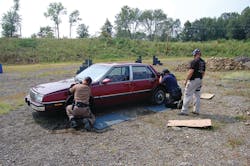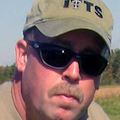Well rounded and ready to win. What are those areas of expertise that are required by the modern crime fighter to win on the streets? Further, what are those skills and abilities which must be maintained throughout your career with due diligence?
Based on my observations of officers on the street over my 30+ career as well as recent training events with personnel during in-service training and at the range, here are some of my thoughts:
- Mind-Set – The mental drive to be a professional law enforcement officer. The further drive to carry on throughout your career. Two things not often mentioned are hardiness and resilience. Most of the stress on this job (a frequently quoted number is 85 to 90%) comes from the agency. With these two mental aspects well developed, you can “roll with the punches” and have the ability to get up off the deck as well as the “intestinal fortitude” to carry on when things get tough – and they will…
- Knowledge of the Law – You want to be decisive on the street. This is based on a thorough knowledge of search & seizure law, state code and local ordinances.
- Physical Fitness – No, you don’t have to be a marathon runner or an MMA fighter, or in least that kind of shape, to be a solid officer (and yes I have LE friends who do both). What you need is a fair amount of aerobic and anaerobic conditioning to be effective. Based on the “specificity of exercise” as my exercise experts relate, it makes sense to develop and maintain your skills practicing those tactics and techniques which you’ll use on the street. Why just lift weights and jog when you can work out on a heavy bag, swing a baton, or engage in sprinting which better prepares you for the street? I’m all for overall health but it’s a win/win to maintain overall health while practicing street relevant skills.
- Communication Skills – This is in both the oral and written communication areas. First of all, model your speaking and verbal skills on what a top performer in your agency does. You know, the kind of officer who can get a violent suspect to cry reminding him that his blessed mother will be disappointed in him if he resists. Or the kind of officer who dominates a domestic disturbance call not in volume or threatening statements but rather with the style, method and content of his verbal interactions. People just listen to the officer and when they do, he fights less and has fewer complaints. Written communication is the benchmark from which you’ll be judged in your career. Everything from traffic stop to felony arrest will be judged or adjudicated based on your written reports. Learn to write well.
- Firearm Skills – As a firearms instructor I am reminded on an almost daily basis that officers who are skilled with firearms do things almost the same way officer to officer and have formed solid “motor programs” which they have practiced to the point they are now habits. In other words a solid draw stroke, or presentation of the pistol from the holster to an on target position, is devoid of extraneous movement and is smooth and efficient. In viewing the draw stroke of multiple high level shooters, you’ll see very little difference. Watching skilled officers load, unload, reload and otherwise “run the gun” you’ll see them practice efficient movements that they can recreate under the stress of a stress shooting course, or confrontation simulation such as a marking cartridge training program. The key for you and me is to learn, develop and maintain those skills. Running around point shooting “spraying and praying” in other words are not solid skills which will serve you on the street.
- Suspect Control Skills – No, you don’t have to be a ninja on the street. But you have to be effective in your hands-on suspect control skills. Once a year, if that, defensive tactics training is not sufficient. In order to control a suspect your skills have to be developed to the point they are easily downloaded from your short term memory and are applied with speed and power. Struggling to remember a joint lock or takedown in the middle of a confrontation is not the way to go and will usually result in failure. Swinging a haymaker punch at a suspect’s head in frustration and anger will frequently result in a broken hand. From handcuffing to integration of control tools like the expandable baton, OC spray and electronic control device as well as being able to strike effectively takes ongoing practice. The truth is, when you need this stuff, you need it bad and you need to be good at it.
- Emergency Response / Pursuit Driving – Officers drive too damn fast. Responding to emergencies or hot calls, officers frequently drive past their abilities and endanger citizens as well as themselves. Blowing through lights driving on an adrenalin rush and “siren hype” can get you killed or worse, kill a family of four who has the right-of-way and didn’t hear your siren or see your lights. An old captain of mine would frequently say to us at roll-call, “Slow down and arrive alive!”
- Emergency First-Aid – We’ve come a long way from learning the ABC’s of first-aid to learning lifesaving combat medical care. We also understand the value of learning self-care to stop major blood loss in that time it takes for police or EMS to reach you under fire. Each day on the range I carry a CAT – Combat Applications Tourniquet, a Quick Clot hemostatic bandage pack, and an Israeli battle dressing. Overkill you say. I’ve had more guns pointed at me on the range in one week than most officers experience their whole careers. I’ve also been present when officers have accidentally shot themselves or have been shot by suspects. When in uniform, the CAT and battle dressing are carried in my left cargo pocket of my duty trousers. Learn trauma care and carry the proper first-aid items on your person.
- Simple Tactics – You don’t have to be a spec ops soldier to effectively search a home or building for a burglar. It doesn’t take a PhD to operate on the street (and a lot of PhD’s couldn’t…). Simple sound tactics put you in a position of advantage and the suspect at a distinct disadvantage. Simple tactics applied to traffic stops such as the call-back and passenger side approach, using cover when approaching a potentially dangerous location, being able to effectively use your flashlight to navigate and locate a threat without compromising your safety, these are all simple tactics which can easily be learned and practiced. Seek out other officers such as SWAT team members who should know this stuff and get some training. Simple sound tactics reduce your risk and improve your safety.
- Appearance – Look good and keep your uniform sharp. Suspects judge you based on your appearance which they equate to readiness. Looking like a bag of rags will not help your survival on the street. Uniform clean and pressed, leather gear clean and sharp, and shoes shined gives you a tactical advantage and is the sign of a professional.
- Equipment – Take care of your gear and it will take care of you. A clean and properly lubed pistol can save your life but other gear such as functioning handcuffs, properly charged flashlights, a back-up gun and other gear and equipment can improve your performance and get you through a dangerous call. Equipment should be inspected before each tour of duty.
- The Trip Not the Destination – As someone once told me about going on vacation, enjoy the trip, don’t wait to enjoy your life once you get there. Yes, at various times in my career I’ve focused more on the time left than on trying to enjoy the moment. Trust me, no matter how much time you have left in your career, it will fly by. Twenty years to go turns into ten and then you’re soon out the door. The idea is to get the most out of each and every day. You’re doing something that few in this world get to do. Law enforcement can be rewarding and fulfilling – make each day count.
- Balance – Don’t be a “one trick pony.” Have balance in your life. Have hobbies and activities and people you interact with outside of this job. Focusing on work only can lead to an unfulfilling life. Work at being well rounded and balanced. Take time for family and friends you’ll be a richer person because of it.
13 to Win – is my offering to you of things you need to practice and perfect. There are certainly more but these areas serve as a starting point for rookie or veteran alike. Now, go out and make them happen and “Let’s be careful out there!”
About the Author
Kevin Davis
Tactical Survival Contributor
Kevin R. Davis retired from the Akron Police Department after 31 years with a total of 39 years in law enforcement. Kevin was a street patrol officer, narcotics detective, full-time use of force, suspect control, and firearms instructor, and detective assigned to the Body Worn Camera Unit. Kevin is the author of Use of Force Investigations: A Manual for Law Enforcement, and is an active consultant and expert witness on use of force incidents. Kevin's website is https://kd-forcetraining.com/

